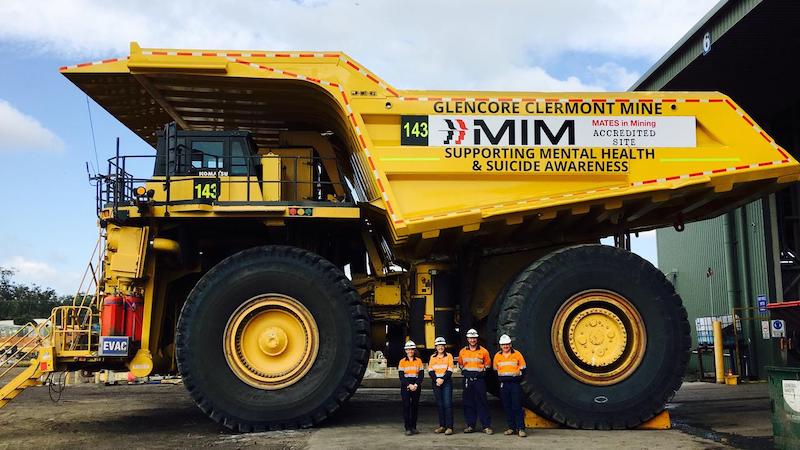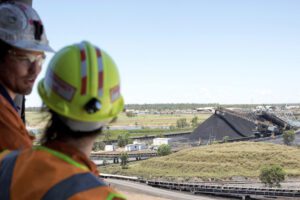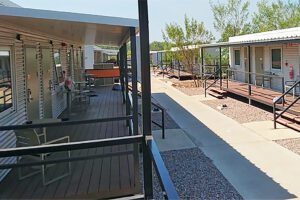Mining workers are being trained to check in on their mates if they suspect mental ill-health, as COVID-19 disruptions to employment and social routines increase pressure on Australians.
Amid an uptick in reported mental ill-health across the country this year, industry-led initiatives including Mates in Mining and company programs are informing the male-dominated workforce how to recognise the signs and what to do about it.
MATES IN MINING – HELPING TO PREVENT SUICIDE IN THE MINING INDUSTRY
Reasons it’s important to get to know your mining-mates
Mates in Mining general manager Suzanne Desailly says the COVID experience has highlighted the importance of protecting workers in the critical industry.
“We’ve seen the economy suffer through COVID, and people rely on the mining industry to pull us out,” she says. “That can only happen if we’ve got a workforce that is mentally healthy. That’s why it’s important to focus on their mental health now, when they’re being relied upon to keep the economy going. It’s adding a lot of pressure to an already pressurised work environment.”
Mining workers are over-represented in suicide rates given the industry demographics — more than four out of five are male and middle-aged — and their employment model of shift work, often in isolated places.
Data from the National Coronial Information System from 2011 to 2014 found mining and construction workers had the highest suicide rates.
Responding to the issue, the peer-to-peer model of Mates in Mining was spun out of the Mates in Construction program in 2015. It uses research-based suicide prevention and support to enable colleagues to offer help.
All staff are trained for general awareness, then additional training is delivered to volunteers for crisis assistance and connecting the person to more help. Staff are also engaged to case manage people until they can access appropriate medical and psychological healthcare.
Desailly says the program is fundamentally about “mates looking after mates”.
“We recognise that when someone might be struggling on a mine site — with thoughts of suicide or with mental-health issues — they’re unlikely to seek help,” she says.
“Our model is around creating help-offering behaviour around that person. It’s about training their colleagues or workers around them to identify … behaviour change or mood change.”
Workers are encouraged to speak frankly to them, asking if they are having trouble or suicidal thoughts, and then knowing how and where to seek appropriate help.
“Actually ask them and have that conversation and not be fearful,” she says.
“There is that misconception that if you ask someone about suicide it will prompt them to think about it, but that is not the case. People are often really relieved when someone says … ‘I’m worried you might be thinking about suicide’.
“It provides people with the skill and confidence to have some of those sensitive conversations and know what to do.”
Research into the program has found a statistically significant increase in people’s likelihood of seeking help and offering help to people in need.
Mentally well workplaces are known to build resilience, skills and engagement, while reducing workplace risks.
In the mining industry, a PwC analysis, Heads Up, found mining companies get a return of $5.70 on mental-health prevention investments, more than double the national average of $2.30, for each dollar invested.
Employee assistance programs, physical programs and partnerships with not-for-profit groups are common among companies.
Glencore, for example, supports Mates in Mining, has an EAP and a Walk and Talk program for staff to engage with the EAP program.
Bloomfield has developed a Mental Safety Toolkit app to prepare managers and workers to provide support before, during and following a crisis.
Chief corporate services officer Renata Roberts says the app provides quality, up-to-date information to help people prepare and work through a crisis.
“In a crisis and preparing for a crisis you really don’t have time,” she says. “The Mental Safety app was designed to get the information at your fingertips when you need it as soon as you need it.”
It includes COVID-19-related information including how to speak with children about it, what to do in lockdown, and the impact of job changes.
“It really is about helping businesses protect the mental safety of their workers, but the workers can be supportive of that too,” Roberts explains.
On an industry level, the Minerals Council of Australia will also roll out its industry-specific app next year, in line with its Blueprint for Mental Health.
Read more Mining Safety News
This article first appeared on The Australian














Add Comment